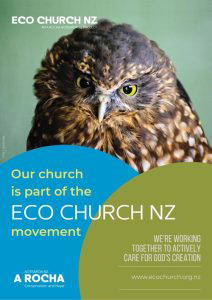https://www.1news.co.nz/2023/10/08/churches-committing-to-eco-friendly-project/
From One News Website
Churches across 12 denominations in New Zealand have signed up to an international project called Eco Church to reduce their impact on the environment.
Chartwell Cooperating Church have installed their first round of solar panels, with plans to cover more of their roof in the future.
Solar power is a clean power source, compared to burning fossil fuels such as gas or coal.
“We’re very aware of the enormous suffering around the world and also in New Zealand; the recent floods are an example of that,” Chartwell Cooperating Church’s Anna Casey-Cox told 1News.
“We really wanted to do more in this space and make a difference where we can.”
The $20,000 project was funded by parishioners and the Methodist Church of New Zealand.
Casey-Cox said the church started their eco church journey by acknowledging and building a relationship with tangata whenua (people of the land) Ngaati Wairere and working on restoring a bush area close to a nearby marae with them.
“One of the cool things about it (Eco Church) is that it builds relationships in your church community, and I think that’s one of the strengths of it cause we’re not going to turn this thing around unless we do it together,” she said.
The church is one of 57 that has committed to the initiative since A Rocha Aotearoa NZ started the country’s version of the international movement in 2020.

“It’s out of that first love for creation, for nature that will inspire people,” national director Kristel van Houte said.
“When we connect to nature, when we understand that we’re a part of it… that inspires action, when we disconnect from it, we don’t want to make a difference.”
When asked how the project will make a difference, van Houte said there’s a huge opportunity for churches to make an impact on the environment by driving collective action to reduce emissions.
“There’s hundreds of churches, there’s thousands of people that go to churches but also churches own a lot of land and so they can re-imagine what land can be used for.”
She said the movement also gives churches an opportunity to rethink how they worship.
“Why do we have to sit in pews on a Sunday morning, listen to someone drone on for 20 minutes?
“Why not go out and restore a riverbed or do a beach clean-up?”
Van Houte said the well-being of all age groups involved is benefiting from being engaged with the environment too.
“We’re really just inviting everyone to come into this space and we really have the perspective that we can all learn from each other,” she said.
One of the latest projects is 360°carbon, which is a carbon emissions calculator which has been developed for the church context with outputs like food and drink, heating and waste.
Ponsonby Baptist Church has calculated their impact, which member Peter Jeffries said was “revealing”.
“It was interesting just how much carbon is created by a simple community activity such as a church,” he wrote in a statement.
The church has since set a goal to become carbon neutral by reducing emissions and offsetting emissions through planting trees on their grounds and in other areas.
“We just thought it was a really useful tool that was on offer to help people start to understand some of the issues around carbon footprints and just the whole realm of lifestyle choices, as well as systemic issues, that we need to come to grips with as a human society in order to give our planet the best possible chance of going into the future in good health,” minister Jody Kilpatrick said.
The church has also taken steps to educate about climate change and advocate for action.
This includes displaying climate information on their walls, making a submission on the Government’s Emissions Budget, protesting in School Strike 4 Climate events, and hosting other interested churches to discuss the issue.
Future goals include replacing gas used for heating with electric options and discussing with businesses that provide services to the church how they can make changes to reduce the church’s emissions further.

